
Residents Facing an Increase of Up to 31% in Their Bills
By now, like most residents in town, you have probably noticed that the fee you pay to your hauler to pick up your garbage has gone up. This should not be a surprise. Starting July 1, haulers were required to pay a tipping fee of $112 for every ton of municipal solid waste (MSW) they dispose of at the Holly Hill transfer station and they are passing these fees on to you and to other town residents and businesses. However, the amount hauler bills have increased is an eye-opener.
We conducted a survey of over sixty households across all districts in town to find out if residents are being treated fairly on hauling fees and if the rate increases they are facing are in line with what the proponents of tipping fees had promised. According to the data, the answer, sadly, is no. The average residential hauling bill has increased by 27% (31% including the new permit fee), more than twice as much as estimated by the team that proposed the tipping fee solution.
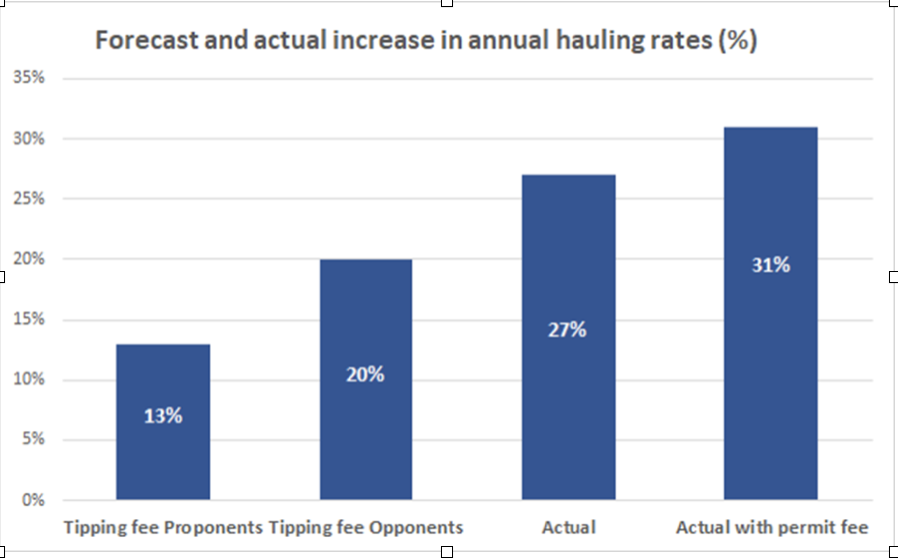
Note: Based on data from 61 residences across districts in Greenwich. Previous hauling rates are prior to July 1, 2020, when tipping fees were introduced.
Town Residents Pay on Average $189 More for Waste Hauling after Tipping Fees
In making their case in papers and presentations released in May 2020, the proponents of tipping fees had forecast that haulers would absorb 25-30% of associated costs and raise rates by about $82 per year, a 13% increase. This was always a disingenuous claim— no hauler should be expected to lose money—but it is worth noting the average increase has come in at $164 per year, double their estimate and 27% above previous rates. Annual hauling fees for residents have hit an average of $770 versus $606 previously. If you tack on the new $25 Holly Hill permit (no fee previously), the average annual bill has increased by 31% or $189, rising to $795.
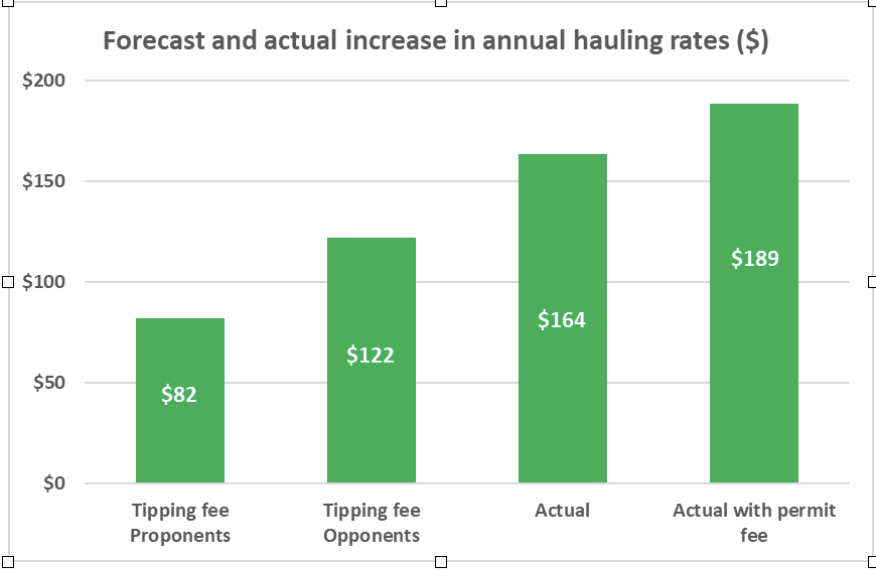
Note: Based on data from 61 residences across districts in Greenwich. Previous hauling rates are prior to July 1, 2020, when tipping fees were introduced.
The opponents of tipping fees, supporting a unit-based pricing system known as Pay As You Throw, had warned that tipping fees could lead to an increase in residential hauling bills of $112-132 per year, a 20% hike. This was based on the assumption that the average household in Greenwich disposes of one ton of waste per year and that haulers would tack on a small safety cushion, but the actual increase has come in even higher. We find it unfortunate that overly optimistic assumptions were used to make the case for tipping fees, misrepresenting the cost to residents versus the Pay As You Throw option.
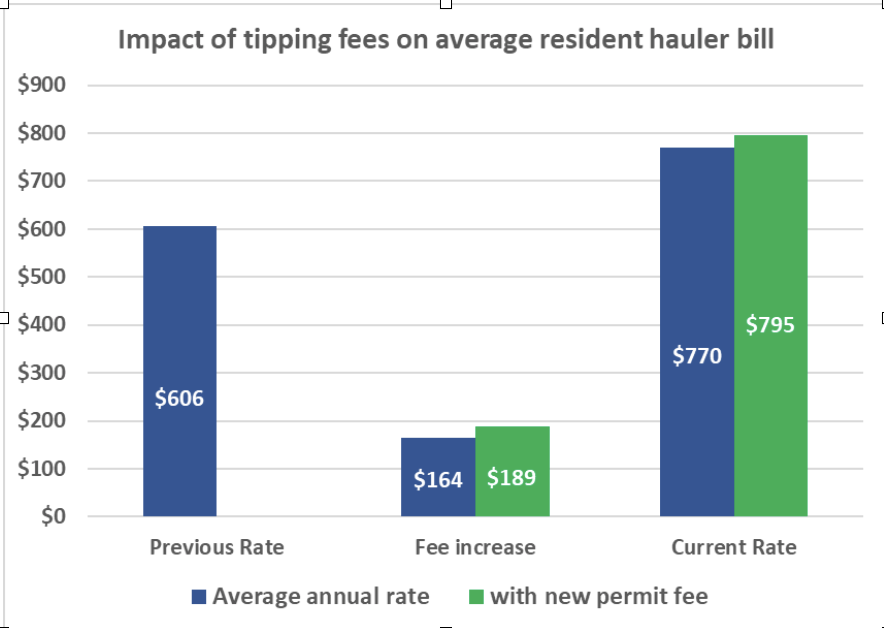
Note: Based on data from 61 residences across districts in Greenwich. Previous hauling rates are prior to July 1, 2020, when tipping fees were introduced.
Tipping Fee Flat Tax is Regressive and it Hurts Our Cherished Town Institutions
The increase in hauler bills for residents due to tipping fees is unequal. Previously, about $253 of the taxes paid by the average household (property value of $1.3 mm) went toward the town’s waste disposal budget. Tipping fees cut this tax burden to $113 per household, a tax savings of $140 per annum. But with hauling fees rising by $164, and permits to Holly Hill now costing $25, the average resident is paying more out of pocket than they previously paid in their taxes toward town waste disposal. In other words, the little guy is picking up a bigger part of the tab for tipping fees. For wealthy residents, the tax savings is much greater than their out of pocket expense, making it a better deal for them.
Moreover, the shift to tipping fees is hitting our town’s religious institutions and not-for- profits. For example, Christ Church’s waste hauling bill was increased by 40%, Temple Sholom’s bill went up by 51%, the Round Hill Community Church bill went up by 53% and the Greenwich Library bill increased by 100%. Straining the budgets of our religious and cultural institutions during a pandemic is shameful. It will now be up to the members of our community to pick up these unbudgeted costs through increased dues and/or donations.
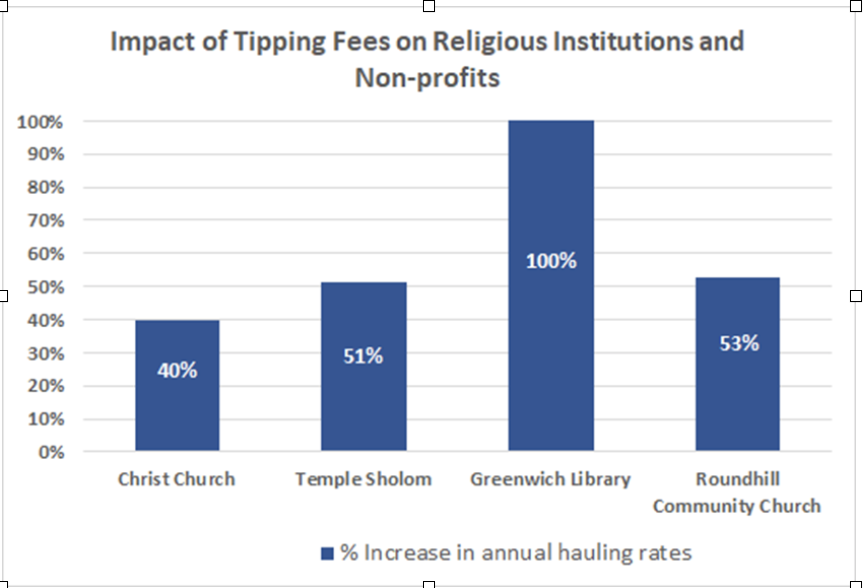
Our contention last May, as it is now, is that tipping fees are a poor choice to resolve municipal waste costs for the town. They do reduce town expenditures on waste but pass these costs (and then some) to residents and businesses as a tax collected by haulers. Tipping fee proponents will likely claim that they are saving taxpayers’ money, but it is not a great deal for the average citizen. Tipping fees are a regressive solution, in that all residents are now hit with a flat tax regardless of income levels (one of the major reasons why 65% of towns in Connecticut do not impose tipping fees on the vast majority of their residents). Imposing a flat tax on residents during a pandemic is just a terrible idea, especially in a wealthy town like ours with abundant reserves.
We Need to Lower Our Waste Production, Not Tax Our Residents
Tipping fees do not tackle the real problem—reducing the total amount of municipal solid waste that our town produces. We send 36,000 tons of MSW every year to incinerators, leading to high environmental and financial costs. We are literally burning our dollars. As long as we produce this much garbage, our town waste disposal costs will continue to rise, leading to a rising cycle of tipping fee rate hikes in the future, as has been the case with most towns that use this solution. It is worth noting that the Hartford incinerator, which processes one-third of CT’s waste, is closing down. The fifty plus CT towns and cities that use Hartford will be scrambling for alternative capacity, leading to higher fees at the Bridgeport facility, where we dispose of half our MSW.
Tipping fees also give residents and businesses little control over their garbage expenses. Under a unit-based pricing system, residents can control the amount of garbage they dispose of and they pay only for what they throw away, much as they pay only for the electricity or gas they use. Residents would get paid a “bonus” for diligent recycling, in the form of lower MSW disposal costs. They also would have a financial incentive to take advantage of the town’s excellent free food scrapping program, launched at Holly Hill on June 15. Food scrapping means much lower MSW volume and both residents and the town would save money under a unit based pricing system. However, under tipping fees, residents save no money on food scrapping unless they haul their own garbage.
The proponents of tipping fees have forecast that waste tonnage disposed of at Holly Hill will be reduced going forward, providing further relief for our town budget. We will be tracking the data to see if this is the case, and if there is a rise in direct drop-off tonnage, leading to increased costs for the town.
What are the Options?
In the meantime, what options are available to residents to reduce their bills? No hauler has been willing to absorb the tipping fee charges, as the proponents of tipping fees promised they would, but neither have they increased rates uniformly, and some offer better deals than others. The average rate today in town is $770 per year or $64 per month. This is the new normal. If you are above this average, you might like to consider negotiating with your hauler to cut your rates or switching to another hauler in your neighborhood. You also can shop around (the town website has a list of licensed haulers) but be aware it can sometimes be difficult to get new haulers into the community.
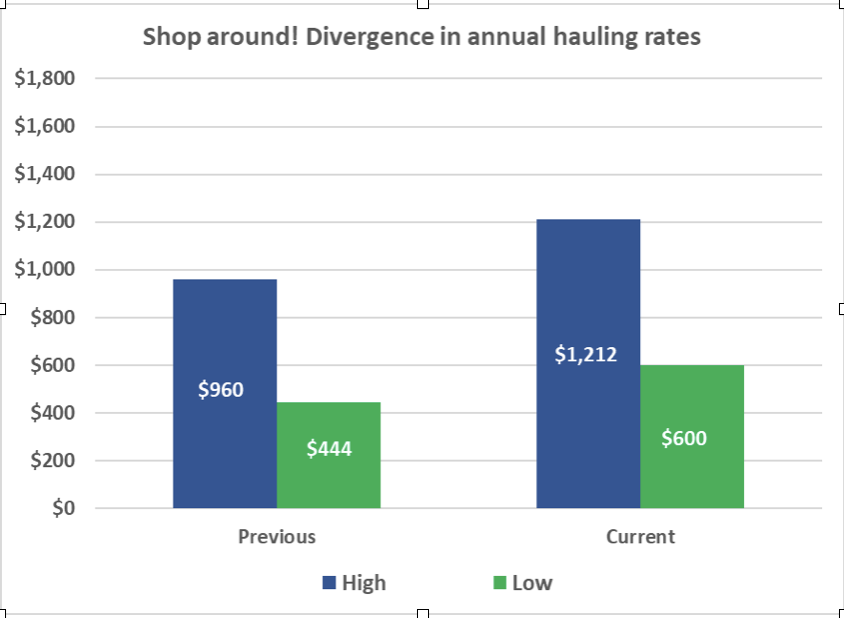
Some neighborhoods have formed housing associations and secured bulk discounts by contracting a single hauler, but this approach is not practical for everyone.
Perhaps the best deal going is to pay $25 per year for unlimited direct drop off at Holly Hill and haul your own garbage. Last year residents dropped off 4,500 tons of MSW directly at Holly Hill at no charge, costing our town about $500,000 in disposal expenses. Tipping fees do not address this expense, and given the rise in hauling rates, more residents may select this option, leading to increased costs for our town. In fact, traffic at Holly Hill has already started to pick-up, and residents are reporting long lines and waiting times on Saturdays. We expect that Holly Hill permit fees are likely to rise in the future, posing a further burden for residents.
The RTM put a sunset clause in place to review tipping fees at the end of 18 months, and First Selectman Camillo has promised to set up a committee to study the impact of tipping fees as well as to review other options. We hope this time is used wisely to consider better long-term financial and environmental solutions for our town.
Data is our friend! In order to inform our advocacy, we need data. Please consider filling out the form below about your costs for trash removal.
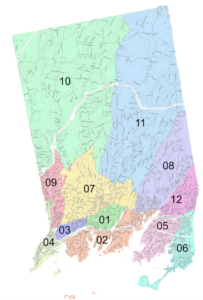
If you’re inspired to take action, write to your RTM members and let them know how you feel.
Got Something to Say?